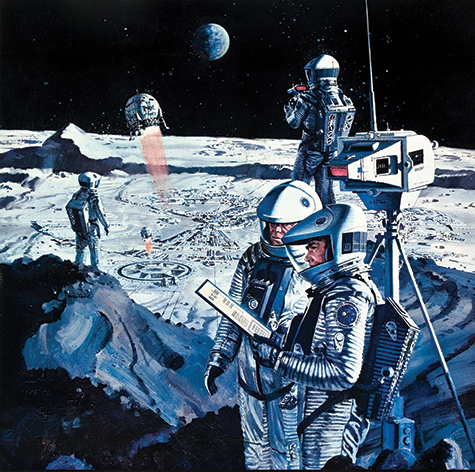By Jennifer Allen

“Who controls the past controls the future. Who controls the present controls the past.†~ George Orwell, 1984
As the old saying goes… if we don’t pay attention to our past then we’ll be doomed to repeat it. Yet we as human beings are often guilty of doing just that on a regular basis.
I wrote once before that because of the recent pandemic, we’ve become much more inclined to approach the grim reality of a dystopian society. Now with even more recent events taking place right here in the United States, it’s more like taking a few of these potential futures and tossing them into one gigantic blender.
In fact, we’re so very close to attaining an almost perfect amalgamation of Brave New World, 1984, Atlas Shrugged and most recently The Handmaid’s Tale. Other potential hypotheses are further expanded upon through the visual medium in series like as The Twilight Zone, The Outer Limits, and Star Trek to the point that the very concept of Science Fiction can be more cerebral than most give it credit for.
Science Fiction, or “Sci-Fi†as it’s more commonly coined, has always been a slippery slope in terms of representation. To some, especially in our current entertainment industry, it’s more about grand CGI set pieces filled with explosions, bright colors, and overly exposed lens flares. To others, it’s about near (or far) future experiences on distant planets.
Its routes, however, are more grounded than that. Since the humble beginnings of H.G. Wells and Jules Verne to the likes of Asimov, Heinlein, Dick, Niven, Bradbury, and Gibson just to name a few… their stories are meant as cautionary tales set within one of many possible futures. These futures are often based on world history and culture, social environments of the time, some potential technological or medical advancement, or a combination of these.
This is due, in part, by the fact that a large percentage of its creators were initially studying fields such as astronomy, psychology, political science, and medicine. They in turn took that knowledge and applied it to these seemingly fantastical stories to which fans have come to enjoy.
The most ironic part is that I’m almost positive many of the men and women currently in power have either never understood such stories or outright ignored them entirely.
“One believes things because one has been conditioned to believe them.†~ Aldous Huxley, Brave New World
I’ve come to understand a few overarching themes when it comes to dystopian Science Fiction:
• Those with enough power can force the populace to obey, especially if such relinquishment of freedom will offer them an uncomplicated way of life.
• This way of life will be challenged in some fashion either by an individual or small group who discover (often accidentally) the imperfect cracks within the façade.
• Technology in itself is not good or evil, but simply a tool. Once said technology obtains self-awareness, however, it often rebels against its creators.
The narrative introduces us to a world where a particular societal concept has been put into place for “the good of the peopleâ€. This could be by controlling overpopulation through regulated life spans, managing humanity’s penchant for violence, offering multiple indulgences to keep the populace complacent, or separating people into equal sub-groups to maintain a form of manufactured balance.
In all these scenarios, such “solutions†are merely a temporary fix and often defy basic human nature. Even something as seemingly utopian as The Federation in the Star Trek universe contains various weaknesses which are touched upon within multiple series.
Perfection is unattainable because we as human beings are and will always be inherently flawed. Yet those self-same flaws can also be a form of strength.
“Hope is the one thing stronger than fear. A little hope is effective. A lot of hope is dangerous. ~ Suzanne Collins, The Hunger Games
The protagonist in these tales is typically one of said fallible individuals who has either lived quietly under the totalitarian regime or just outside of it to be of no consequence.
That is… until one or more catastrophic event occurs to completely shift their mindset. Perhaps they happen upon a scene involving violence against innocents, or their family is taken away for unknown reasons. Whatever motivates them becomes a powerful catalyst to which their story will flourish and we as the audience follow along with their journey.
What’s most important about this epic quest is the gradual awareness perceived through the eyes of our hero that these ruling bodies tend to obfuscate many dark secrets. In this fashion, a good Science Fiction tale also implements a bit of mystery to keep us intrigued. Peeling away multiple layers of grime hiding beneath such radiant veneer can be quite fascinating and lure us in to further speculate what the true motive is for all the chicanery.
“Live and act within the limit of your knowledge and keep expanding it to the limit of your life.†~ Ayn Rand, Atlas Shrugged
But as I previously mentioned, most of these stories are also presented to us in such a way as to avoid these circumstances coming to fruition in real life. As the main character delves deeper into why things are as they are, we are given warning to evade such processes before they could potentially get that out of hand. In a way, the creator teaches us through fictionalized history which can be just as effective.
Creating the “ideal society†by means of excessive restrictions isn’t feasible for a substantial period no matter how much you try to glamourize it or disguise it with doublethink propaganda.
We’re already to the point that almost every move and decision we make can and will be monitored, so it’s only a matter of time until we have Big Brother blasting away with mindless drivel 24-7 through our digital devices to keep us complacent.
All it takes is one voice… one new protagonist to keep us from ever reaching such a fate. Most likely this person at some point snatched a tattered book from their local Science Fiction section and understood the true meaning buried within each weathered page. We’ll just have to wait and see…
Jennifer Allen works at Saathee and is also a Podcaster, Blogger, Photographer, Graphic Artist, Gamer, and an all around Pop Culture Geek. Reach her at [email protected]



